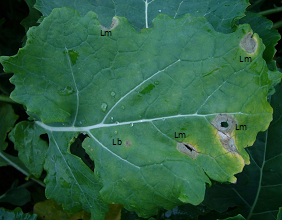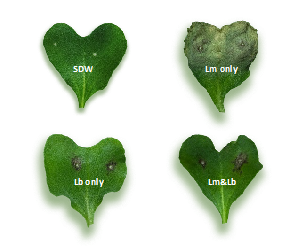Competitions between two pathogen siblings affect severity of oilseed rape phoma
 Professor Yong-Ju Huang is a Professor of Plant Pathology at the University of Hertfordshire. Here she shares recent studies by PhD students at the University of Hertfordshire have shown that the outcomes of competitions between two closely related causal pathogens of phoma stem canker, affect the disease severity on oilseed rape (OSR).
Professor Yong-Ju Huang is a Professor of Plant Pathology at the University of Hertfordshire. Here she shares recent studies by PhD students at the University of Hertfordshire have shown that the outcomes of competitions between two closely related causal pathogens of phoma stem canker, affect the disease severity on oilseed rape (OSR).
Economic losses caused by phoma stem canker
Oilseed rape is a major source of vegetable oil, livestock feed and biodiesel worldwide. It is an important cover crop in the UK and places an important role in rotation. Phoma stem canker is a damaging disease of oilseed rape (e.g.100% crops affected with phoma leaf spots in the autumn 2019), causing losses to UK farmers in the region of £60-90M each year (CropMonitor). Phoma stem canker is caused by two closely related sibling pathogens Leptosphaeria maculans (Lm) and L. biglobosa (Lb). They attack oilseed rape in different ways. Lm is generally considered more damaging than Lb because Lm is often associated with damaging stem base cankers, whereas Lb is generally associated with superficial upper stem lesions. In autumn and winter, Lm causes more damaging large phoma leaf spots with pycnidia (asexual fruiting bodies) while Lb only causes small dark phoma leaf spots with no or few pycnidia (Fig. 1). Previous research showed that Lm can produce a phytotoxin sirodesmin PL to enhance its infection, whereas Lb does not produce this phytotoxin. Therefore, reducing the infection by Lm should be a priority to reduce the severity of phoma stem canker.

Figure 1. Phoma leaf spots caused by two closely related sibling pathogens Leptosphaeria maculans (Lm) and L. biglobosa (Lb).
New discovery will potentially provide sustainable ways to fight against phoma stem canker
Although Lm and Lb co-exist on oilseed rape causing phoma leaf spots in autumn and phoma stem canker in the following summer, there is little research on understanding the interactions between them in terms of disease development. Previous studies showed that pre-infection of oilseed rape by Lb can induce resistance to infection by Lm. This suggests that it is possible to use the less damaging Lb for control of the more damaging Lm, and subsequently reducing the disease severity.
Further research showed that the phytotoxin sirodesmin PL produced by Lm has antimicrobial and antifungal properties, and can inhibit the growth of Lb in culture. This suggests that Lm may produce the phytotoxin as a ‘chemical weapon’ to interfere with its competitor Lb for access to resources. However, recent research showed that when Lm and Lb were grown together simultaneously in liquid culture or cotyledons of oilseed rape, the production of the phytotoxin sirodesmin PL had been inhibited. Lb can inhibit Lm production of the phytotoxin to increase its competitiveness over Lm, leading to reduced severity of leaf lesions.
When cotyledons of oilseed rape were inoculated with Lm only, typical large grey lesions were produced. However, when the cotyledons were inoculated with both Lm and Lb together, Lb type of small dark lesions were produced since Lb over competed Lm to prevent the growth of Lm (Fig. 2). Further investigation showed that the timing when Lm and Lb meet significantly influences the outcomes of the competitions between them; Lb can inhibit the growth of Lm and its phytotoxin production if Lb arrives three days earlier than Lm in liquid culture or on cotyledons of oilseed rape.
The results have been published in the peer reviewed journal Pest Management Science (DOI 10.1002/ps.7275 & DOI 10.1002/ps.7799). Since Lm is more damaging than Lb, the outcomes of their competition within their host oilseed rape will affect the severity of phoma stem canker, with less Lm growth in the stem leading to less severe stem canker.
Effective control of crop diseases is hugely important for food security. The control of crop diseases is often done using chemical fungicides. However, these have additional cost to farmers and they can easily lose their effectiveness due to development of fungicide-insensitivity in pathogen populations. These new findings provide us with a new opportunity for investigating alternative methods for control of phoma stem canker.
These new findings suggest that it is possible to use the less damaging species Lb as a biocontrol agent to control the more damaging species Lm, subsequently reducing the severity of stem canker and reducing yield loss.
The new discovery will set the groundwork for biocontrol of phoma stem canker, using pre-infection of oilseed plants with the less damaging Lb as ‘plant vaccine’ to improve the plant immune system and protect it against the more damaging Lm. This will reduce the use of fungicides, decreases costs and reduces environmental impacts, thus providing a sustainable disease management method.

Figure 2. Lesions on cotyledons of oilseed rape inoculated with conidial of Leptosphaeria maculans only (Lm only), L. biglobosa only (Lb only), L. maculans and L. biglobosa simultaneously (Lm&Lb) or sterilised distilled water (SDW) as a control.
AFCP partners help to train young scientists for future agriculture
The University of Hertfordshire works closely with the AFCP and partner charities. The research was carried out by two PhD students (James Fortune and Evren Bingol). James’s PhD project was co-funded by Hertfordshire Local Enterprise Partnership, Felix Thornley Cobbold Agricultural Trust and Chadacre Agricultural Trust. Evren’s PhD project was co-funded by Hertfordshire Research Fund, Felix Thornley Cobbold Agricultural Trust, Chadacre Agricultural Trust and the Perry Foundation. James has finished his PhD and is working for The Vegetable Consultancy Services (UK) Ltd as a Research Consultant Agronomist. Evren is in the final year of his PhD and hopes to pursue a career in agriculture research. Another of our final year PhD students (Laura Sapelli) was co-funded by Hertfordshire Local Enterprise Partnership and the Perry Foundation and is working on light leaf spot, another important disease of oilseed rape and other Brassica crops. With a one-year industrial placement at ADAS, she is inspired to pursue a career related to agriculture or food production.